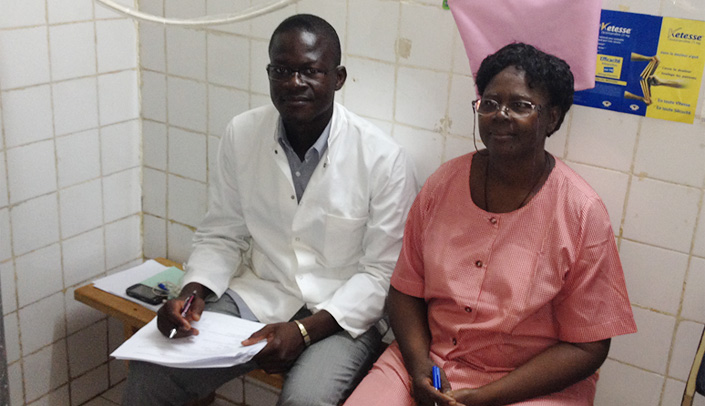Salomon Compaore, M.D., spent the summer in his homeland, Burkina Faso, a landlocked country in West Africa, conducting research on cervical cancer.
He was one of six College of Public Health students who conducted cancer research in Africa this summer through the college’s Cancer Epidemiology Education in Special Populations (CEESP) program. Five other students had research projects in minority and special populations in the United States.
The CEESP Program funds master’s and Ph.D. public health students who conduct cancer research in minority populations within the U.S. and around the world. Funded by a grant from the National Cancer Institute of the National Institutes of Health, the program provides educational opportunities and mentored field internships for students to learn about cancer epidemiology and translation of epidemiology into cancer control and prevention interventions.
Dr. Compaore pitched his project to Amr Soliman, M.D., Ph.D., professor and chairman of epidemiology and program director for CEESP, one day after he was admitted to UNMC’s master’s of public health program.
“The project was shaped under the guidance of my mentor Dr. Soliman, who visited me in Barkina Faso, and conducted on the field with the help of my preceptors Ouedraogo Charlemagne, M.D., Ob/GYN, and epidemiologist Dr. Koanda Seni,” he said. At the Yalgado Ouedraogo University hospital in Ouagadougou, the capital and largest city in Burkina Faso, Dr. Compaore interviewed women daily to learn what barriers they face to cervical cancer screening.
“Many women seemed to confuse cervical cancer with breast cancer. When asked about cervical cancer symptoms, many of them talk about breast lumps. Even after the screening and biopsy, some women still had a low awareness about the disease,” he said.
Dr. Compaore spoke to women who had lived in exile for more than a decade and were happy to finally have access to health care and women who required a translator because they could not speak French or any of the local languages.
“I learned from this adventure that simple public health interventions, such as awareness activities, can make a big difference in developing countries such as Burkina Faso where the literacy rate is far from optimal,” he said.
“This experience broadened my perspective of public health practice and provided me the opportunity to deal with the challenges of working in countries with limited resources. It was enriching.
“I would recommend this program to every public health student.”
